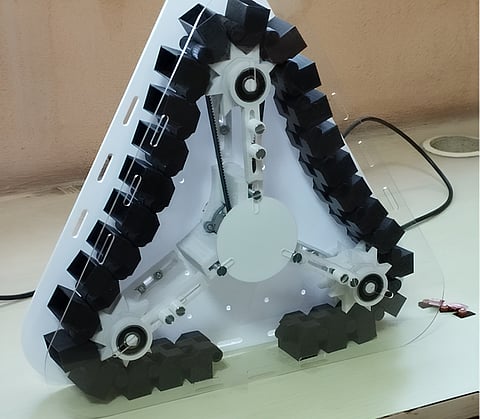

Chennai: Patient compliance with medication has always been a significant challenge to achieving better treatment outcomes. While compliance issues are common in home care, assisted living, and even hospital settings, traditional methods often fail to ensure patients adhere to their prescribed medications.
This is where innovation plays a crucial role, especially in remotely managing medication adherence for bedridden patients or those with limited mobility. MIT World Peace University (MIT-WPU) in Pune has recently developed a modular, Internet of Things (IoT)-enabled tablet and capsule dispenser, designed to automate and remotely monitor medication management. This innovation stands out as a significant contribution to India's ongoing med tech revolution.
According to the researchers, the device aims to assist individuals with complex dosing schedules by ensuring precise and timely medication dispensing. Unlike traditional dispensers, which often require manual intervention and lack remote monitoring capabilities, MIT-WPU's solution integrates advanced IoT connectivity with a modular design, they claims.
The device features an equilateral-shaped container, a motor-driven dispensing system, and a controller unit that allows users to define dispensing schedules and enables real-time remote monitoring.
"In today's fast-paced world, maintaining consistent medication adherence is a major challenge, especially for individuals managing complex medical regimens. This innovative IoT-enabled pill dispenser represents a major step forward in addressing this issue," says Dr. Amol Tagalpallewar, Professor at the School of Pharmacy, at MIT-WPU.
By automating the dispensing process and offering remote monitoring, the technology empowers patients and caregivers with greater control. "This device is not just about dispensing pills; it's about improving health literacy and enhancing the quality of life," he adds.
Functionally, the dispenser uses dispensing units arranged circumferentially, connected by sprockets and powered by a motor. The controller unit sends command signals at user-specified times, automating the dispensing process. IoT integration enables caregivers and healthcare professionals to monitor medication adherence in real time, improving patient safety and care. This device is designed to enhance medication management in home care, assisted living, and hospital settings.
"Furthermore, this device represents a significant step toward the future of healthcare delivery, where technology and human-centered design converge to create more accessible, efficient, and effective solutions. We envision a future where technology is not just a tool, but a partner in promoting well-being and improving the quality of life for all," says Dr. C. H. Patil, Associate Professor at the School of Computer Science and Engineering, MIT-WPU.
With India witnessing a rise in chronic illnesses and an aging population requiring consistent medical care, this innovation is set to make a significant impact in home care, assisted living, and hospital settings.
However, the researchers have not yet shared details regarding the commercialisation plan, including technology licensing, manufacturing, scalability, or cost. Therefore, the accessibility and ultimate utility of the technology will depend on how the industry advances it to the end user.